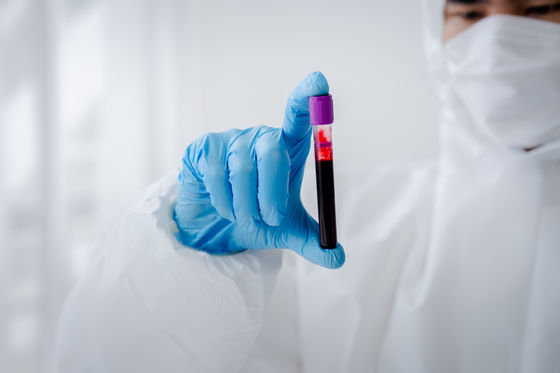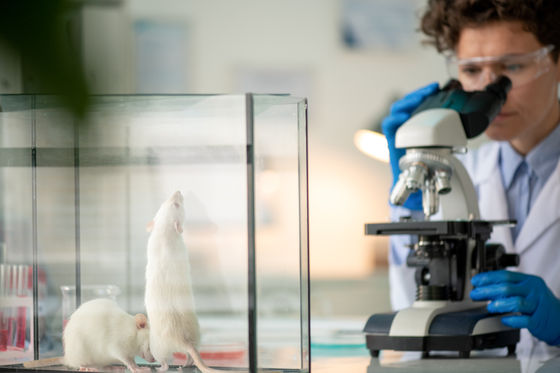A blood factor that rejuvenates the aged brain is identified, separate research teams reach one answer and publish three papers simultaneously

In pursuit of youth, research has been conducted on transfusions of young people's blood and experiments on injecting animals with the anti-aging hormone '
Platelet factors attenuate inflammation and rescue cognition in aging | Nature
https://doi.org/10.1038/s41586-023-06436-3
Platelet factors are induced by longevity factor klotho and enhance cognition in young and aging mice | Nature Aging
https://doi.org/10.1038/s43587-023-00468-0
Platelet-derived exerkine CXCL4/platelet factor 4 rejuvenates hippocampal neurogenesis and restores cognitive function in aged mice | Nature Communications
https://doi.org/10.1038/s41467-023-39873-9
A Secret in the Blood: How PF4 Restores Youth to Old Brains | UC San Francisco
https://www.ucsf.edu/news/2023/08/425981/secret-blood-how-pf4-restores-youth-old-brains
'Young blood, Klotho, and exercise can somehow blast the brain into saying, 'Hey, let's work better,'' says deputy director of the Bakar Institute on Aging at the University of California, San Francisco. A certain Saul Vileda.
Vileda and his team, who were conducting research on restoring the ability of old mice with the blood of young mice, found that platelet factor 4 (PF4), which has the function of coagulating blood when bleeding, restores brain function. I figured it out.
Moreover, two teams that were working on rejuvenation research with different approaches from Mr. Vileda also reached PF4, so the researchers simultaneously published three studies focusing on PF4 from different angles. decided to

◆ young blood
In 2014, Mr. Vileda discovered that plasma, which was obtained by removing red blood cells from young mouse blood, restored brain function in old mice. Vileda et al., who continued their research after that, found that young blood plasma contains more PF4 than old blood.
Therefore, when the research team administered PF4 alone to aged mice, it exhibited almost the same effect as when injected with young mouse plasma, and the aged mice achieved excellent results in tests of learning and memory. Ta. The research team speculates that PF4 may improve the aging immune system, which may restore cognitive function by suppressing brain inflammation.
'PF4 rejuvenates the immune system, which reduces aging-related immune factors, reduces brain inflammation, increases brain flexibility, and ultimately improves cognition,' Vileda said. We are raising 22-month-old mice, which are equivalent to humans in their 70s, but PF4 rejuvenated the ability of mice to the late 30s to early 40s.'

◆ Kroto
Kroto is a hormone named after
Dana Duvall of the University of California previously reported that injecting ``Klotho'' activated the brains of old monkeys, but since Klotho itself does not break through the blood-brain barrier, why does the brain rejuvenate? It wasn't clear until now.
Therefore, the research team focused on the factors contained in the blood. Duval et al., who analyzed the blood of mice that were administered Klotho and had improved cognitive function, confirmed that Klotho activates platelets contained in the blood, which releases PF4 from platelets.

When Duvall conducted an experiment administering PF4 to mice, both old and young mice improved learning and memory, so PF4 may also help improve cognitive function in young brains. was shown. Mr. Duval also confirmed that Klotho improved cognition in mice lacking PF4, indicating that there may be factors other than PF4 that improve cognitive function.
In addition to elucidating the mechanism by which Klotho restores brain function through an increase in PF4, the existence of undiscovered factors leading to improvement in cognitive function was also suggested. “We want to be able to prepare multiple treatments that maximize efficacy with minimal side effects for cognitive impairment, one of the biggest problems in medicine.”
◆Exercise
It is well known that exercise is good for mental and physical health, but a research team led by Tara Walker of the Queensland Brain Research Institute in Australia has found that exercise releases PF4 into the blood of mice, It has been found that it promotes the regeneration of brain cells and improves cognition.

PF4 is also known as a type of signaling substance 'exerkine' that is released by exercise. Previous studies have shown that excelkine is involved in the improvement of cognitive function during exercise. Since the effect was confirmed, it was confirmed that the platelet-derived excelkine CXCL4, or PF4, is involved in this mechanism.
“Pharmacological interventions are an important area of research for people with health and fitness problems, and the elderly, who are unable to exercise,” said Walker. We confirmed that it can promote neurogenesis, strengthen cognitive function, and counteract age-related cognitive decline.It should be noted that this is not a substitute for exercise, but age and brain damage It may be useful for improving cognitive function in people who cannot exercise.'
Related Posts:
in Science, Posted by log1l_ks







